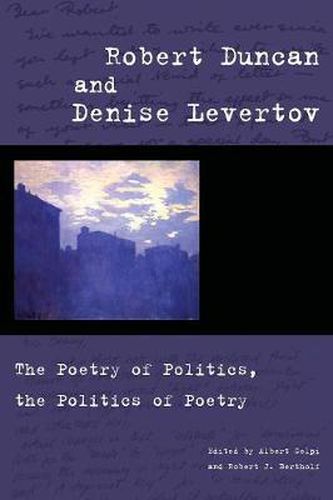Readings Newsletter
Become a Readings Member to make your shopping experience even easier.
Sign in or sign up for free!
You’re not far away from qualifying for FREE standard shipping within Australia
You’ve qualified for FREE standard shipping within Australia
The cart is loading…






This collection of essays, written for this volume and often using unpublished and archival materials, converges around the usually close and intense relationship between Robert Duncan and Denise Levertov, two of the most important and remarkable American poets in the second half of the twentieth century. Their association, played out in their poems and in an extraordinary exchange of letters, was based on a sense of the visionary imagination informing the direction and shape of the poet. However, they had a falling out during the Vietnam crisis over the relationship between poetry and politics, between the private and public responsibilities of the poet.
Such issues are vital not only to their poetry and the poetry of that period but to contemporary poetry as well. A distinguished group of critics, led by Albert Gelpi and Robert J. Bertholf, examines the issues that drew Levertov and Duncan together, and split them apart, in a book that has the openness and coherence of an urgent, contemporary dialogue about the form and meaning of poetry.
$9.00 standard shipping within Australia
FREE standard shipping within Australia for orders over $100.00
Express & International shipping calculated at checkout
This collection of essays, written for this volume and often using unpublished and archival materials, converges around the usually close and intense relationship between Robert Duncan and Denise Levertov, two of the most important and remarkable American poets in the second half of the twentieth century. Their association, played out in their poems and in an extraordinary exchange of letters, was based on a sense of the visionary imagination informing the direction and shape of the poet. However, they had a falling out during the Vietnam crisis over the relationship between poetry and politics, between the private and public responsibilities of the poet.
Such issues are vital not only to their poetry and the poetry of that period but to contemporary poetry as well. A distinguished group of critics, led by Albert Gelpi and Robert J. Bertholf, examines the issues that drew Levertov and Duncan together, and split them apart, in a book that has the openness and coherence of an urgent, contemporary dialogue about the form and meaning of poetry.